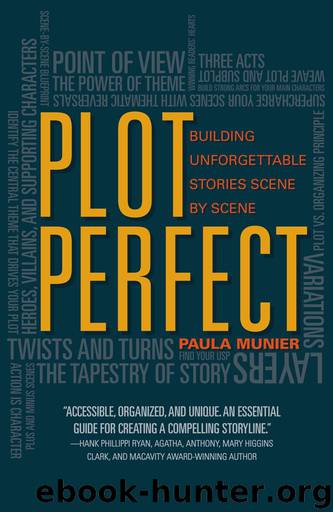Plot Perfect: How to Build Unforgettable Stories Scene by Scene by Paula Munier

Author:Paula Munier [Munier, Paula]
Language: eng
Format: epub, mobi
Publisher: F+W Media
Published: 2014-10-17T00:00:00+00:00
WHAT HAPPENS ON PAGE 50?
Many writers are so attached to every word they write that they find it impossible to cut, even when they should. If you even suspect that your beginning is too slow, you’re right. Try this: Turn to page 50 of your novel (or memoir). (It takes many writers fifty pages to warm up and settle into their story.) Now ask yourself: What happens on page 50? Is that where your story really begins?
THE TOP TEN REASONS WE KEEP READING
Just as there are reasons we’ll stop reading, there are reasons we’ll keep reading. When you’re working on your beginning, keep these in mind.
SOMETHING HAPPENS. Make sure something compelling happens—and you can ensure it does by incorporating story questions, the inciting incident, the catalyst, plot point 1, etc.
THE STORY IS TOLD IN A STRONG VOICE. Think Holden Caulfield in The Catcher in the Rye, Bridget Jones in Bridget Jones’s Diary, Charlie in The Perks of Being a Wallflower.
THE LEVEL OF CRAFT IS HIGH. Knowing how to tell a story is as important as the story itself.
THE CHARACTERS MAKE ME FEEL SOMETHING. Reed Farrel Coleman, three-time Shamus award winner and two-time Edgar-nominated author of the Moe Prager mysteries, says he always aims to evoke a feeling of poignancy in his opening pages. What feeling does your opening evoke? What happens to create that feeling?
THE WRITER HAS GAINED OUR CONFIDENCE. This you do by writing with authority and confidence. The stronger the action, the easier it is to write with authority and confidence.
WE WANT TO KNOW WHAT HAPPENS NEXT. Story questions are the secret here; plant them early and keep them coming.
THERE’S SOMETHING UNIQUE ABOUT THE STORY/STORYTELLER. This speaks to your USP, which should be on display in your opening pages, as well as through the remainder of the book.
IT’S CLEAR WHAT KIND OF STORY IS BEING TOLD. Readers want to know that they’re reading the kind of story they like. If you’ve written a romance, then the beginning must read like a romance—otherwise you’ll confuse your readers. A confused reader is a lost reader.
THERE’S A MARKET FOR THIS KIND OF STORY. This is a consideration for agents and editors more than readers. Having a strong USP is critical in this regard.
THE PROSE IS CLEAN, CLEAR, AND CONCISE. The cleaner, clearer, and more concise your prose, the more direct your communication with your readers. And the more professional you appear to people in publishing.
Download
Plot Perfect: How to Build Unforgettable Stories Scene by Scene by Paula Munier.mobi
This site does not store any files on its server. We only index and link to content provided by other sites. Please contact the content providers to delete copyright contents if any and email us, we'll remove relevant links or contents immediately.
The Kite Runner by Khaled Hosseini(5183)
Gerald's Game by Stephen King(4656)
Dialogue by Robert McKee(4406)
The Perils of Being Moderately Famous by Soha Ali Khan(4221)
The 101 Dalmatians by Dodie Smith(3512)
Story: Substance, Structure, Style and the Principles of Screenwriting by Robert McKee(3470)
The Pixar Touch by David A. Price(3442)
Confessions of a Video Vixen by Karrine Steffans(3311)
How Music Works by David Byrne(3272)
Harry Potter 4 - Harry Potter and The Goblet of Fire by J.K.Rowling(3076)
Fantastic Beasts: The Crimes of Grindelwald by J. K. Rowling(3059)
Slugfest by Reed Tucker(3007)
The Mental Game of Writing: How to Overcome Obstacles, Stay Creative and Productive, and Free Your Mind for Success by James Scott Bell(2909)
4 - Harry Potter and the Goblet of Fire by J.K. Rowling(2704)
Screenplay: The Foundations of Screenwriting by Syd Field(2647)
The Complete H. P. Lovecraft Reader by H.P. Lovecraft(2565)
Scandals of Classic Hollywood: Sex, Deviance, and Drama from the Golden Age of American Cinema by Anne Helen Petersen(2526)
Wildflower by Drew Barrymore(2489)
Robin by Dave Itzkoff(2441)
